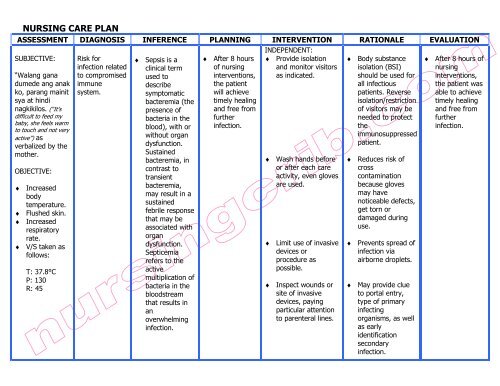
Care Plan For Risk Of Infection. A balanced intake of omega 3 and omega 6 fatty acids protein vitamins a c and e zinc and iron is essential in reducing the risk of infection. Risk for infection is one of the common problems of an individual wherein there is an alteration or disturbance in the immune defenses which causes microorganisms to enter and invade the body which later one causes different kinds of infections. The risk for infection care plan interventions and rationale the success of a risk for infection care plan is dependent on the kind of interventions a caregiver will make. Washing between procedures reduces the risk of transmitting pathogens from one area of the body to another e g perineal care or central line care.

These microbes will invade and attack the body and thereby. Risk for infection care plan human immune system is made up of a variety of cells that are designed to protect the body from different pathogens such as bacteria viruses fungi etc. Download view care plan risk for infection 2 as pdf for free. Wash hands before and after all care contacts. Monitor temperature at least every 8 hours and notify physician if greater than 100 8 f. Helps reduce the stasis of secretions in the lungs and bronchial tree.
Evaluate sputum characteristics for frequency purulence blood and odor.
This ultimately reduces the risk for bladder infection or urinary tract infection. Risk for infection care plan human immune system is made up of a variety of cells that are designed to protect the body from different pathogens such as bacteria viruses fungi etc. Monitor temperature at least every 8 hours and notify physician if greater than 100 8 f. These microbes will invade and attack the body and thereby. Help patient change positions frequently. Evaluate sputum characteristics for frequency purulence blood and odor.